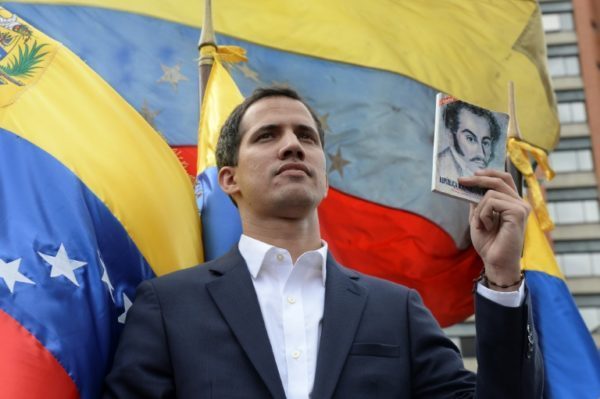Maduro suggests arrest of Guaido on return to Venezuela

Venezuelan opposition leader, Juan Guaido, could be arrested if he returns to his country from a visit to Colombia, President Nicolas Maduro suggested in an interview published on Tuesday.
“He can’t just come and go. He will have to face justice, and justice prohibited him from leaving the country. I will respect the laws,” Maduro said.
Venezuela’s Supreme Court banned Guaido from travelling abroad in January.
The ban is in force while he is under investigation over what Attorney-General, Tarek Saab has called “serious crimes violating the constitutional order.”
Guaido nevertheless crossed over to the Colombian border city of Cucuta over the weekend to oversee the delivery of humanitarian aid into Venezuela, which was prevented by Venezuelan soldiers firing tear gas and rubber bullets.
Maduro regards the aid plans as a U.S. plot to overthrow him.
Guaido then travelled to the Colombian capital, Bogota, for a meeting of the Lima Group of American countries, most of whose members have recognised him as Venezuela’s interim president.
He has told Colombian media he will soon return to Venezuela, but Maduro said he would then have to “answer before justice.’’
“It is not Nicolas Maduro who is in the position to arrest anybody in this country … The courts have their processes and they give orders to the executive branch – that through the scientific police.
“And also the national police – they take action every day in the face of different crimes against different criminals.
No one can be above the law,” Maduro said.
Similarly, more than 320 members of the Venezuelan security forces have deserted and crossed over to Colombia, Colombia’s migration authority said on Tuesday.
A total of 326 soldiers and police have arrived in Colombia since the Venezuelan opposition launched an operation to deliver humanitarian aid into the country on Saturday.
The vast majority have entered the department of Norte de Santander, where an aid storage centre is located.
Others have sought assistance from the migration authority in the departments of Arauca and La Guajira, as well as in the cities of Valledupar, Cartagena de Indias, Medellin and Bogota, the capital.
Some came in uniform and others in civilian attire, said Christian Sarmiento, Director of the Migration Authority.
Some came with their families. Many of the security force members have requested asylum in Colombia. (dpa/NAN)

